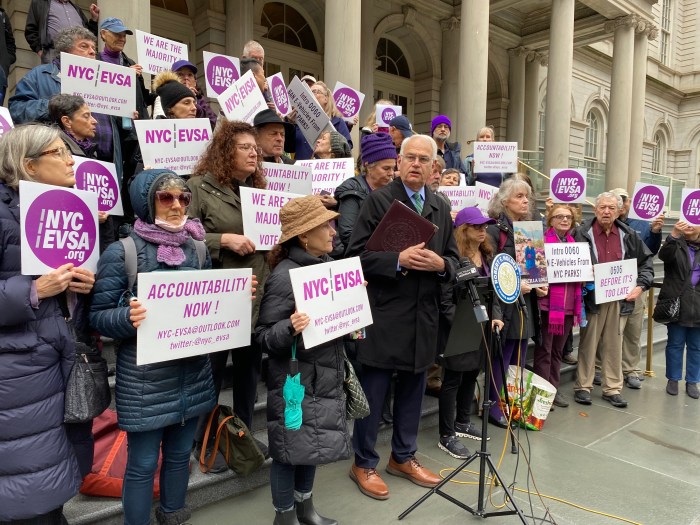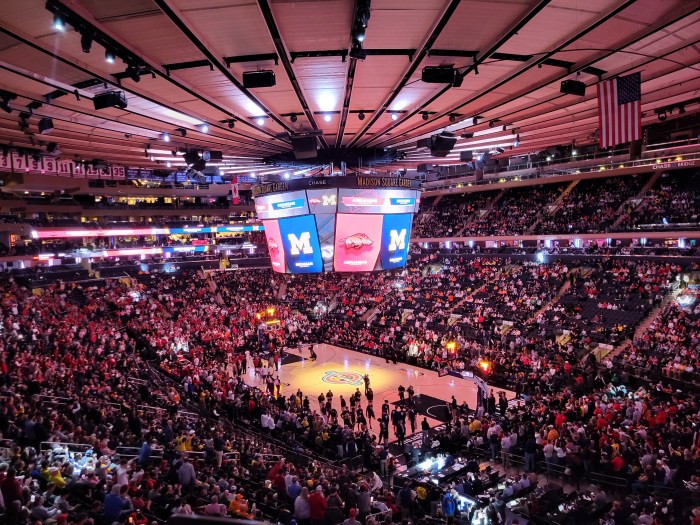
90 West St. tenants met Monday to talk about winning rent protections based on a law that only applies to Lower Manhattan.
BY DUSICA SUE MALESEVIC | Jessica and Taylor West have been living with their three children at 90 West St. for seven years.
Two of their children go to P.S./I.S. 276 in Battery Park City and they hope their third will attend there as well.
They were recently informed, however, that the rent for their two bedroom apartment would increase by 33 percent.
“We were floored, no, we were shocked,” she said.
West was talking to her neighbors at a meeting she helped organize at Hudson Eats in Brookfield Place on Mon., June 29.
They were there to discuss 421-g, a tax abatement program from the ‘90s that offered developers tax incentives to turn Lower Manhattan offices into residential buildings. In return, the apartments in those building were to be rent stabilized.
“I heard whispering in the building about 421-g,” West said.
At least 35 people — including a few who came in strollers — gathered to hear about the possibility that their apartments at 90 West could be rent stabilized.
Melissa Harrington has lived at 90 West St. for nine years and had heard conversations in the building about this issue. She wanted to learn more, Harrington told Downtown Express before the meeting began. She loves the building and the neighborhood.
The Wests read a recent Wall Street Journal about a tenant facing a similar rent increase in another Financial District building.
They contacted Joel Roodman, featured in the article. Roodman and his wife Jill Tafrate have lived at 85 John St. since 2007 with their two kids. Their daughter, who now goes to Lower Manhattan Community Middle School, attended P.S. 234 and their son is currently a student there.
“We very much set ourselves to be part of this community,” Roodman said in a phone interview last week.
In April, when they received their renewal notice for their rent, it was raised 28 percent, he said.
“Suffice to say we were shocked,” he said. “What is this all about — how can you just raise it 28 percent. They went from $7,200 to $9,500 — just like that, bang.”
Attorney Serge Joseph, who has litigated two cases on 421-g, said the vacancy decontrol that usually kicks in when rents get too high, does not apply to this Lower Manhattan law.
Tafrate retained Joseph after reading his blog.
He brought up 421-g with his building’s manager and “three days later they sued [us] in New York Supreme Court,” he said.
Kibel owns 85 John St. and 90 West St. as well as other properties.
Sherwin Belkin, Kibel’s attorney, did not say whether the apartments were rent stabilized, in an email to Downtown Express. He said, “90 West St. is fully compliant with the existing state and city laws, and our units reflect the pricing of the Lower Manhattan rental market. We are committed to providing the best possible value to our residents.”
Roodman has been organizing the tenants at 85 John St.
“Since this has happened, we’ve galvanized a lot of people in the building here and a few others,” he said.
The Journal reported that at least 32 buildings — over 5,000 apartments — are under the 421-g program. People from those buildings have been contacting Roodman.
“I’m prepared to fight,” West said at the meeting.
Joseph spoke after West and told those gathered, “The statute is very clear and unambiguous.”
The only exception is if the building is a cooperative or a condo, he said.
Records from the Department of Finance shows that Kibel is receiving $351,617.42 residential conversion abatement for 90 West.
Joseph was the lawyer in a 2009 case in which a tenant at 37 Wall St. stopped paying his rent due to what he said were adverse conditions in the apartment, including mice. The landlord sued him, but a judge ruled that the building was receiving the tax abatement and thus the apartment was subject to rent stabilization.
In 2010, Downtown Express reported that over 5,000 apartments could be rent stabilized in Lower Manhattan, but not many tenants took advantage.
More recently, on May 20, a New York State Supreme Court judge affirmed the earlier decision. If a landlord is receiving the tax abatement, its units are subject to rent stabilization.
There four benefits when you have rent stabilized apartment, Joseph explained. A tenant has the right to renew their lease, will know what the increase is as it is set by the Rent Guidelines Board, the right not to be evicted except for very specific grounds and the right to succession to a family member, he said.
On June 29, the Rent Guidelines Board voted for a rent freeze for the first time in its history. There is no increase for a one-year lease and a two percent increase for a two-year lease.
Joseph suggested a multi-plaintiff case to the tenants gathered as it is both cost effective and “sends a fairly loud strong message to a judge.”
The landlord cannot retaliate against you for exercising your rights, Joseph told them.
“This is a community wide issue,” said Paul Newell, Democratic District Leader, who attended the 90 West meeting. “We have an opportunity here to dramatically change the neighborhood’s character for the better.
Community Board 1 member Tom Goodkind, for half a decade now, has been working with Joseph to spread the word about 421-g and rent stabilization.
“You’re all here — that’s incredible,” said Goodkind. “I’m really blown away. You’re neighbors — we want to keep you as neighbors.”



































